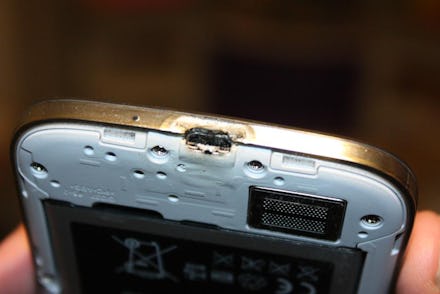A Man's Samsung Galaxy S4 Phone Caught Fire — Here's What Samsung Did After the Incident

The news: A Canadian man named Richard Wygand is claiming that his Samsung Galaxy S4 mobile phone caught on fire while it was charging, waking him to the sickly aroma of burnt plastic and smoldering electronics — and that Samsung attempted to silence him when he reported the problem.
The damage to Wygand’s phone, and his account of the fire, can be seen in the below video.
Fortunately, the fire appears to have been limited to the charging port, and didn’t spread to the phone's volatile lithium-ion battery. Wygand, who goes by Ghostlyrich on YouTube, alleges that when he contacted Samsung to report the incident, he was provided with a confidentiality waiver that would prevent him from discussing the details and terms of his settlement, and which also dischares Samsung from any liability. Rather than sign and return the document, Wygand recorded a second video, in which he suggests that silence might not be the best way for the company to deal with a potentially deadly product flaw.
The background: Cell phone fires are surprisingly uncommon, but they have the potential to be incredibly damaging, especially given the amount of time the devices spend in close proximity to users’ bodies and the fact that overheated lithium-ion batteries can, and do, explode. There have been several previous reports of fires related to the Samsung Galaxy S4, including a phone that exploded in an Oregon man’s pocket, causing burns, and one that started a ruinous house fire in Hong Kong. However, the South Korean manufacturer’s phone doesn’t appear to be any more dangerous than its competitor, Apple’s iPhone, which has also been known to light up. The Galaxy S4 has proved immensely popular, and Wygand’s claim is unlikely to cut into sales or Samsung’s increasing market dominance.
The use of lithium-ion cells in somewhat larger fire-prone devices, such as the Boeing 787 Dreamliner and the Tesla Roadster, has also come under scrutiny this year, and prompted tighter battery standards.
The takeaway: The legal notice from Samsung probably doesn’t represent a massive cover-up on the part of the electronics company so much as a pro forma attempt to avoid tort claims. Even so, it’s easy to see why the corporation’s instant appeal for confidentiality is frustrating, especially when it comes to a product issue that’s likely to impact, and possibly injure, others. We can only hope that Samsung will still provide compensation to Wygand, while doing its best to be frank with and ensure the safety of all of us.